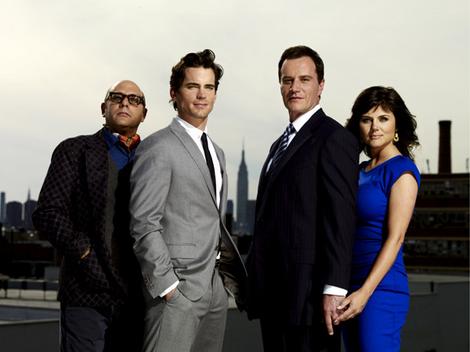I don’t remember what first perked my interest in the show White Collar. I likely heard something about it while watching another USA network show such as Psych or Burn Notice. And generally, if a show is on USA, I usually don’t need to hear anything else to try it out, or at least watch a few promos and uncover the premise.
If I wasn’t hooked already, the first five minutes of the pilot episode would have been enough to do so. It opens in a prison, where an inmate shaves his beard, changes into a guard’s uniform, swipes a forged key card, and proceeds to walk out the front door. That is our first introduction to Neal Caffrey, con artist extraordinaire.
FBI agent Peter Burke, the only man who’s ever been able to catch Caffrey, is called in. He deduces the reason Neal would escape with only a few months left on his four-year sentence, and brings him back in with four more years added to his sentence.
But con artists know how other con artists work, and Neal is able to strike a deal with the FBI – serve out the remaining years while working to catch other criminals for the FBI’s white collar crime division, under the supervision of Agent Burke.
Peter’s solidness and by-the-book methods contrast with Neal’s charm and out-of-the-box thinking, and the two gradually come to trust each other. Since the show focuses on white-collar crimes, it’s a refreshing change from most crime dramas’ “murder of the week” scenarios. It also keeps the show free from most gruesome images, sensual scenes, and crude language.
Neal is played by Matt Bomer, who had a reoccurring role in Chuck as Brice Larkin. And I can’t write about White Collar without mentioning Neal’s friend, Mozzie, an OCD conspiracy theorist who doesn’t trust Feds (or as he calls them, suits. Peter is the Suit, his wife Elizabeth is Mrs. Suit, and FBI agent Diana is Lady Suit).
White Collar just finished season two, ending a major plot arch and adding a final twist for the cliffhanger. I must admit, though, it wasn’t nearly as powerful of an ending as the previous 3 (season one ending and the two mid-season breaks). In a way, I’m grateful, as those 3 made me nearly go crazy waiting to find out what happened. This one has far less emotional ties.
I’m still ambivalent about White Collar adding Sara Ellis as a permanent member of the cast for season three. I didn’t feel much chemistry between her and Neal these last few episodes, though I think they had some earlier this season.
Even though the season didn’t end as strongly as I hoped, much of season two was excellent, particularly the third episode from the end, “Payback,” the mid-season finale “Point Blank,” and the retrospective “Forging Bonds.”



















